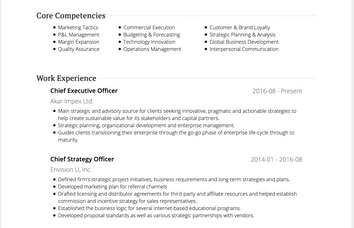
The Ultimate Guide to CV Writing

Whether you’re changing jobs, shifting careers or looking for your first full-time position, you’ll need a CV. A tidy way to say curriculum vitae, a CV is a written overview that summarizes your skills, work experience and qualifications. Almost 100% of employers will ask you to submit one.
Recommended links:
- Our collection of 500+ professional resume examples.
- Our gallery of 20+ downloadable resume templates.
Putting a CV together is a great exercise in reviewing your strengths and experience. Here’s everything you need to get started.
What Employers Want to See on Your CV
A CV is a personal marketing tool. It is a document for advertising your skills and accomplishments and for showing that you are a step above the competition. Even if you aren’t a salesperson by trade, this is your chance to sell yourself. You need to show employers that you have the qualities and experience to excel in the role and bring value to the company. Employers are on the lookout for someone who can help them make money, better serve clients or customers, and solve problems. This is where your CV comes in.
One thing employers don’t want to see is a generic CV. You can’t rely on a single unchanging CV for every application. Every time you apply for a job, your CV must be customized to suit that specific role. If your CV is too general or too vague about your skill set, you should take the time to revise it. By tailoring your CV to the position, you increase your chances of getting an interview by 61%.
Be confident in your skills and experience before you apply. Even the best salespeople will struggle to sell a product they don’t believe in. If you’re confident that you are a fantastic fit for this job, your enthusiasm and suitability will come across clearly in your CV.
Many companies have a set of values that guide how they operate. If these values aren’t mentioned in the job posting, you can usually find them on the company’s ‘about us’ page or on a separate ‘values’ page. Employers want to know if you’ll be a good fit for their corporate culture, so do your research. If one of their values is ‘putting people first’, for example, include this sentiment in your summary or as part of a job description (if it makes sense to do so).
Employers want to see a simple and focused CV. Don’t fill yours with buzzwords for the sake of using buzzwords. Only include experience that’s relevant to the role. Use approachable language and short sentences so that your CV is easy to read. Hiring managers go through hundreds of CVs, so the easier it is to understand your CV the likelier it is they will actually read it.
The spelling and grammar in your CV should be perfect. Hiring managers won’t look kindly on a CV filled with errors, so it is important to proofread yours closely and fix any problems. An even better option is to have another strong writer take a look at your CV, even if you think your editing skills are world class. When we spend time writing something, it’s easy for our eyes to get tired and to make simple errors, like putting an apostrophe in the wrong place. Employers respond well to applicants with strong attention to detail, regardless of the job.
Last—and definitely not least—employers want to know that you’ve carefully read the job description and that you really want to work for their company. Did they say you need to know another language to apply? Make sure this is on your CV. Do they need someone with a certain degree or professional designation (like Red Seal or CPA)? Highlight your experience so it’s crystal clear.
There’s also a difference between an asset (a nice-to-have) and a requirement (a must-have). Make sure you fit the requirements, or you’re wasting time customizing your CV for a role you won’t likely get. (There are exceptions—if an employer is asking for 5-7 years of experience for a role where you only have 4, but you meet all other criteria, it’s still worth applying.)
How to Write a CV
When writing your CV, it is important to ensure that it is professional and will meet the expectations of employers in your industry. You’ll need to include certain components, and it’s important to choose the right words. Once you’ve established the basics, you can customize the CV to reflect your personality.
If you want yours to hit the nail on the head from the start, consider the following:
Presentation and length: Your CV should be visually pleasing, simple and easy to read, with plenty of white space and padding around the text. It should be no longer than two pages. You don’t need to design it yourself—start with a Standard template and go from there.
Customization for industry and role: A targeted CV may not include all of your experience and qualifications—it only needs the information that is relevant to the company in question. If you are applying to be an office coordinator, for example, the employer doesn’t need to know that you were a cook at McDonalds ten years ago. Make sure the design also fits industry expectations.
Formatting: Your CV should list all of your contact information at the top. Following that, you may want to include a summary statement that highlights your relevant high-level skills. The bulk of your CV should consist of your work and/or volunteer experience in reverse-chronological order, followed by your education.
Note that there are some cases where a reverse-chronological CV isn’t the best choice. Check out our Ultimate Guide to CV Formatting for a detailed overview and to find out which format you should use.
Summary or profile: Best for those who are switching industries or don’t have a lot of experience, start with a brief overview of your skills, a summary of who you are, and what you’ll bring to the company. Don’t just throw around buzzwords (“efficient” “organized” “reliable”) unless you can back them up with examples. Two to three sentences is all you need here.
Work experience or career history: Show how your experience brings value to the company. Make sure it’s specific and quantifiable. Did you increase profits? Did you exceed performance goals? Use numbers as often as possible. Only include experience that is relevant and recent. If you don’t have much paid experience, talk about the skills you gained through volunteering. Whatever you do, focus on performance and results.
Education: Generally, you should only highlight formal training, studies, or certifications when it is relevant to the role. However, if you have, for example, a degree in History but you have the right work experience to apply for a marketing role, you should still mention your education because it shows that you follow through on long-term commitments. Don’t forget to include the years you studied or received your degrees, diplomas or certificates, the name of each program, and where you received your education. If you’re entering the workforce for the first time and you’re applying for a job in your area of study, feel free to include your GPA (but only if it’s high!).
Technical skills, languages, hobbies and more: If they are relevant to the position, include these details in separate sections. Engineering and tech roles will likely need someone with technology-specific skills, for example. A tourism job—or a role in a bilingual city—might require a second language. And for a company with a fun-loving corporate culture, including your pastimes could help show off your personality. Whatever you decide, make sure that you have a good reason to include this information.
Once you’ve created your first CV, you can customize it for each role. Think of it like repainting a wall: regular updates will give it new life, and sometimes a different color looks better behind your new furniture. With VisualCV, you can easily make copies of your standard CV and cater each one to a different role or industry.
Why Tone and Voice Matters
When was the last time you misinterpreted a text message? Would the meaning have been more clear in person? Probably. With CVs, your only chance to communicate is on paper, and your tone and voice can say a lot about you.
Tone is how you express your attitude through writing. By choosing certain words and putting them in a certain order, you can sound excited, matter-of-fact, funny, or pretentious. How do you want to come across to your target audience? Are you “great at working with C++” or “proficient with C++”?
You can adapt your tone to suit your industry. For example, a casual CV in the finance world could either characterize you as friendly and easygoing, or overeager and inexperienced. If the company seems ultra conservative, consider cutting out your signature exclamation marks and using sophisticated language when describing your accomplishments. Even with some minor (but important) adaptations, you can still sound like ‘you’.
Voice is how you express your personality through writing. It can tell the employer about your demeanor. Which one of these sentences sounds friendlier?
“I am good with people.”
or
“I love working with people!”
If you’re a serious, formal person, you might never use contractions (“it is” vs. “it’s”). You might also naturally write using complex words and sentences.
If you’re a playful, casual person, you might use exclamation marks, approachable words like “love”, and humor in your writing.
It’s important to be authentic but self-aware. How do others read you on paper? Do you sound like someone an employer would hire? If you can meet or exceed expectations for personality and soft skills, you’re one step closer to landing an interview—no matter how experienced you are.
Get Attention With Compelling Words
Your experience should speak for itself—but it doesn’t. What’s the point of having an incredible work history if it doesn’t translate nicely on paper? Tone is one element that can completely reshape your writing. But the right words will make your application stronger, especially when a hiring manager has been skimming through boring CVs all day.
Keywords
Firstly, make sure you’re including the right keywords. Read the job posting carefully and note how the employer describes the ideal candidate and expected tasks. Do they use words like “entrepreneurial”, “senior”, or “positive”? If you include some of the terms and phrases used by the posting, you’re less likely to get filtered out by an Applicant Tracking System (ATS). Used by many employers, an ATS is a program that helps hiring managers automatically select best-fit candidates for a role where there’s a high volume of applications.
Mention the job title somewhere in your CV—it usually fits naturally in your summary. And as we suggested earlier, you should also familiarize yourself with the company’s values and include these keywords where possible. Even if an ATS doesn’t catch them, a hiring manager will notice and appreciate your attention to detail.
Action words
Secondly, use action words to describe your accomplishments. Instead of ‘helped’, a stronger word might be ‘enabled’ since it implies you held more responsibility. Instead of saying ‘responsible for’, a stronger word would be ‘coordinated’.
Here are some examples of action verbs you could use:
- Trained
- Directed
- Managed
- Solved
- Initiated
- Controlled
- Coordinated
- Executed
- Produced
- Built
- Grew
Check out a longer list of words in our resume guide.
New Grads: Writing a CV Without Work Experience
You may not have experience in your field of choice, but with a little creativity you can still write a great CV and prove you’re the best applicant for the job.
If you’ve spent most of your life in school and this is your first time applying for a full-time job, you can include informal paid experience from your teen years like babysitting, dog walking, cutting lawns or shoveling snow. Highlight transferable skills that you can bring to the new role, whether it’s critical thinking, problem solving, money management, or customer service.
Now more than ever, companies are focusing on corporate social responsibility. By volunteering at a charity or taking a leadership role in a community club you can demonstrate your character and showcase your ability to follow through on commitments.
For more insight, check out these 13 tips on how to write a CV when you have no experience.
Changing Careers: Writing a CV Without Qualifications
Before moving forward, take a step back. When changing careers, Randstad recommends carefully evaluating your situation, identifying your skills, strengths and weaknesses, and networking and volunteering in your new field of choice.
If you are switching careers, you likely developed some transferable skills in previous positions. Highlight leadership positions, relevant projects, and any other roles where your past responsibilities intersect with your new career path.
For example, as a former social worker looking to make the jump to HR, you can point out your training in psychology and explain how your understanding of human behavior overlaps with the role in question.
Whatever your situation, make sure your CV highlights what you can bring to the table based on your previous experience.
Include a summary
If you are changing industries, you may want to consider opening your CV with a personal summary. As an opening statement, this brief description should introduce your experience and skills and make clear how they have prepared you for the role you are applying to.
A summary is an effective way to preface your work experience when it might not be directly related to the position. You can use this space to explain how your work in a different industry has prepared you for this one. More than just a casual introduction, a good summary will describe how you can bring value to your new role and field.
Accounting for gaps
What if you have a gap in employment? Consider a combination CV format or, if the gap was less than a year in length, leave off exact employment dates (months) and just include the years you worked.
The big takeaway: never lie about your experience, or lack thereof. If there’s one thing that can ruin your chances of landing (or keeping) that big job, it’s dishonesty. Three out of four hiring managers say they’ve caught a lie on a resume, and it’s never worth compromising your integrity.
If you’re applying for a job and you aren’t a perfect fit, determine which elements from your experience are transferable to the role and which of your qualities reflect the employer’s ideal candidate. Even if you don’t meet all of the criteria, you may still have a chance.
Should You Hire a Professional CV Writer?
You wouldn’t believe how many people say they’re ‘detail-oriented’ in their summary while the rest of their CV is littered with spelling and grammar mistakes. If you aren’t a good writer or don’t trust your writing skills, hiring a pro could be the difference between landing the job and landing in the discard pile.
Some job-seekers are great writers, but they overdo it, loading their CVs with unnecessary jargon and long sentences. Some managers need to read through hundreds of applications, and they can tell within 6 seconds if you’re a good fit or not. No matter how amazing your experience is, you can’t hide bad writing and formatting.
You would probably hire someone else to renovate your kitchen, knowing that they would do a better job. In that same spirit, hire a professional CV writer if you want a final product that sells you as a candidate and is catered to your target industry. A resume writer can tell you if a chronological or functional CV is better suited for the role and choose the most fitting layout.
So who do you hire? Google ‘resume writer’ and you’ll find over 6 million results. But anyone can hang up a shingle and say they’re an expert. Here’s how to find the cream of the crop:
Ask for referrals. Find out who your friends and colleagues recommend. Whether it’s a company or an individual, take the time to compare.
Review their qualifications and experience. Have they written for your industry? Even better, have they worked in HR? Why hire someone just to type up your career history when you can do that on your own? You have a personal brand, and like a marketer, your CV writer should be able to help you express it and make impactful first impressions on paper.
Read through testimonials and examples. Hire someone who can provide strong references and success stories. Read through before-and-after samples. They should cater each CV to the client rather than use a cookie-cutter tone or voice.
Understand the process. Find out how many revisions are included, and if you’ll correspond by phone or email.
If you decide to write your CV yourself, start with one of our templates or check out the ultimate resume guide for more tips.
Think Before You Apply
Before you send anything to an employer, carefully reread the job description and look over your CV again. Do you think you’re a top contender for the role? Does your CV show how you meet most or all of the employer’s criteria? Is it easy to read, and does it include keywords or phrases from the job description? Is your experience clear and are your accomplishments measurable?
Did you remember to include all of your contact information?
Every employer likely has an ideal candidate in mind for the job. Unless you have an ‘in’ with that company’s HR team, you don’t know what that candidate is like. All you can do is cater your CV to the job description, let your tone and voice show off your personality or professionalism, and describe your experience as best you can.
Send, relax, and wait. You can’t force yourself to fit a job that isn’t right for you. But when the perfect one comes along, you’ll be glad you took the time to make your application shine.
Have you finished reading the guide but still need to get started? Check out VisualCV’s CV templates here.

Written By
Ben Temple
Community Success Manager & CV Writing Expert
Ben is a writer, customer success manager and CV writing expert with over 5 years of experience helping job-seekers create their best careers. He believes in the importance of a great resume summary and the power of coffee.

Explore the best CV layout ideas and design tips that our CV professionals picked out for 2024.
September 18, 2020
Read Post

Community Success Manager & CV Writing Expert

Fitting all of your skills and work experience onto a single page is tough, but with these simple tips your one-page resume will be ready in no time.
November 14, 2019
Read Post

Co-Founder & Director

A great resume lists your achievements, not your responsibilities.
October 14, 2021
Read Post

Community Success Manager & CV Writing Expert
Copyright ©2024 Workstory Inc.